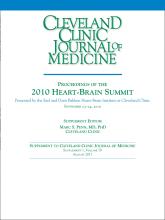ABSTRACT
Exercise, considered a mainstay of cardiac rehabilitation, has been shown to reduce cardiac risk factors such as hyperlipidemia and hypertension. Growing evidence also suggests that exercise has beneficial effects on mental health, which is relevant for cardiac patients because of the prognostic significance of depression in patients with coronary heart disease (CHD). Depression has been associated with increased mortality and nonfatal cardiac events in patients with CHD; it is also associated with worse outcomes in patients who undergo coronary artery bypass graft surgery and those who have heart failure. The standard therapy for depression is pharmacologic treatment, often with second-generation antidepressants such as selective serotonin reuptake inhibitors. Despite their widespread use, antidepressants have only modest effects on depression for many patients compared with placebo controls. Exercise therapy, already an established component of cardiac rehabilitation, has potential efficacy as a treatment for depression in cardiac disease patients. Randomized controlled trials are needed to determine the clinical effects of exercise in this population and to compare the effects of exercise with those of antidepressants.
Footnotes
Dr. Blumenthal reported that he has no financial relationships that pose a potential conflict of interest with this article.
- © 2011 The Cleveland Clinic Foundation. All Rights Reserved






